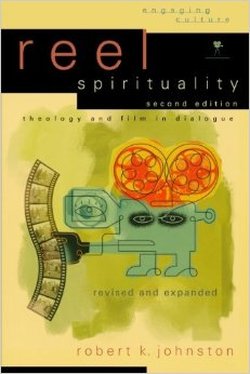
By Robert K. Johnston
Summary
Robert K. Johnston’s Reel Spirituality: Theology and Film in Dialogue explores the play between the words “real” and “reel.” Real spirituality is that which is true, authentic, and genuine. Reel spirituality is the spirituality that is attached to cinema, or film reels. The question this book seeks to answer is, “Is reel spirituality, real spirituality?” It is quickly apparent that the answer this book makes is an unabashed “yes.” Citing examples from more than 700 films, author Robert K. Johnston draws on the theological framework of “common grace” to illustrate how the axis of our experiential, or “Spirit oriented” and critical, or “Word oriented” human characteristics connect us with the reality of God interwoven in film.[1]
In referring to spirituality, Johnston is not referring to religious acts performed or implied onscreen. It is rather the transcendent experience of the Holy had by the viewer that is in focus.[2] When we watch films, we have the opportunity to vicariously experience more of life than we could without the stories, visuals, and audio cues onscreen. Films can transport us "to a more central region where life takes on a richness and texture not ordinarily experienced.”[3] Moreover, through both the mundane (watching film) and the depiction of the mundane (the film itself), the Holy Spirit draws and instructs us (Is. 23:23-26, 29). As Johnston puts it, “God might attempt to bring the best out of us through the work of our wider culture (including the film industry).”[4] The truth in film’s story, as it is shaped by the various aesthetic and dramatic effects, resonates with us in the core of our being. The Spirit uses it to engage and teach us in “all of life.”[5] When this happens, reel spirituality is real spirituality.
Critical Dialogue
While there are many strengths in Reel Spirituality, this review will focus on only one, what I am calling Johnston’s realism (as opposed to idealism). Realism is a humility which is uncharacteristic to many Evangelicals. Whereas an idealist approach pigeonholes films with keywords like "Christian" or defines the reaction viewers “ought” to have, Johnston’s realism accepts that people may have a wide array of responses to any given film. This realism does not prescribe reactions; rather, Johnston describes his own reactions and waits for others to declare what they experience. As noted above, Johnston’s pneumatology allows his realism to take this broad perspective: “Christians need not claim that non-Christian filmmakers are covert Christians or simply appropriate from their movies what is congenial to or congruent with their understanding of the Christian faith.”[6] Viewers are free to accept and contemplate the real effects any film has on them; there is no need to cognitively reduce spiritual experiences to so-called “Christian films,” nor is there a need to suggest that all of our “spiritual” experiences are clearly and explicitly Christian in content.[7] This approach is manifested in Johnston’s own descriptions of the films that have affected him. As we read his stories, we are drawn into the narrative of his own personal experiences with film.
For anyone who has grown up in an overly-realist theological culture, this book offers a breath of fresh air by allowing us to acknowledge our participation in the Spirit in films’ affective influence. Moreover, reel spirituality frees film viewers to partake in conversations about film without feeling pressure to arrive at a predetermined conclusion. Finally it allows us to begin probing the hearts and minds of fellow viewers to discern where the Spirit is moving through the magical medium of film.
-------
[1] Robert K. Johnston, Reel Spirituality (Grand Rapids: Baker Academic, 2006). 282.
[2] Johnston, 97.
[3] Johnston, 266.
[4] Johnston, 99.
[5] Johnston, 94.
[6] Johnston, 100.
[7] Johnston, 56.
[8] Johnston, 22.
 RSS Feed
RSS Feed
